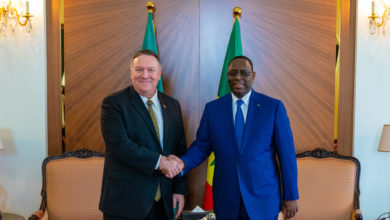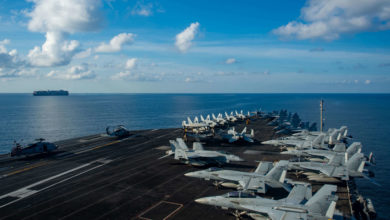Russia’s direct military intervention into Syria has dramatically changed the dynamics of a war that has raged since 2011. The fighting during the last four years has torn this historic Arab country to shreds, made millions of Syrians into refugees, and left more than 200,000 people dead.
The stage has been set for a possible major military counteroffensive against arch-reactionary Islamic military organizations who have been gaining more and more territory.
After four years of fighting against these groups, the Syrian army has been forced into an ever smaller portion of western Syria. The Russian intervention is meant to bolster their effort, stop the retreat before the armies of the so-called Islamic State (ISIS or ISIL), Al-Qaeda and others, in preparation for a military counteroffensive.
The main force preventing Syria from being completely overrun by ISIS and Al-Qaeda has been the Syrian Arab Army, the national army of the country. Between 50,000 and 85,000 Syrian soldiers have been killed in this fight already. Syrian Kurdish forces under the leadership of the People’s Protection Units (YPG) have also been heroically battling against ISIS. The YPG had earlier fought against the Syrian army in an effort to create a Kurdish-ruled autonomous area in the northern part of Syria.
Now the Russian military has directly entered the battle on the side of the Syrian national army. Russia may directly give assistance to the Kurdish fighters as well. Russia’s intervention was formally requested by the sovereign Syrian government led by Bashar Al-Assad and thus conforms to international law.
The stated position of the Russian government is that a long-term solution to the Syrian crisis is through political change, based on dialogue between the Baathist government and some of the opposition but not ISIS or Al Qaeda, and the retention and defense of Syria’s core state institutions.
The Russia-Syria connection
Russia and before it the Soviet Union were historic allies of the secular Baathist government in Damascus, with deep military, social and economic ties to the country.
It is critically important that progressive forces abandon the false language and political characterizations being spoon-fed to the public by the pro-imperialist media.
Assad is characterized as a “dictator” who is “killing his own people.” That works for demonization purposes, but it cannot help anyone establish an informed position about the social and political character of the different forces in the Syrian war. When reading the Western news, one would think every death has been at the hands of the Syrian government. There has been almost no mention of the social base of support for the Syrian government, or the 50,000-80,000 Syrian soldiers who have died fighting sectarian armed groups, including ISIS and al-Qaeda.
The Syrian Baathist government, like the Iraqi Baathist regime, banned sectarian-based religious parties. Saddam Hussein also banned the Communist Party while establishing a secular-based social democratic economic and social program. In Syria, the Baathists worked with some Syrian leftists and repressed others.
In 2011 and 2012, the Russian government hosted meetings in Moscow of Syrian opposition groups that stood politically against Assad and demanded far-reaching political reforms from the regime but rejected foreign intervention and armed struggle. Most of these opposition groups were secular.
U.S. policy and the rise of ISIS
The United States, France, Britain and their allies in Turkey and Saudi Arabia took a different path. The United States and its NATO and regional allies have funneled weapons and money to right-wing armed sectarian groups since the Syrian civil war began in 2011. This quickly morphed into the dominance among the armed opposition in Syria of the Islamic State, Al-Qaeda and other groups.
In its reckless effort to smash the Assad government, as it did to Qaddafi’s in Libya, the Obama administration cared little about the political character of the “rebels.” In so doing, they created a monster they could not control.
Even as ISIS and Al-Qaeda grew stronger and grabbed more and more territory from the besieged Syrian army, the Obama administration aimed its fire at the Syrian government. The CIA kept coordinating massive weapons shipments from Turkey, Saudi Arabia and Qatar that allowed the armed opposition to get ever stronger. In August 2013, John Kerry and the Republicans in Congress demanded the bombing of the Syrian national army and government military assets, not ISIS or the armed opposition groups.
Then in June 2014, ISIS shocked the United States by defeating the Iraqi army and seized control of Mosul, Iraq’s third largest city, and much of Anbar province, and seemed to threaten U.S. assets in Iraq. In a panic, Obama suddenly changed course, sent thousands of U.S. military personnel back to Iraq and announced the open-ended bombing of ISIS positions in Syria and Iraq.
Obama announced the new military campaign against ISIS on September 10, 2014 but also reiterated that the United States would continue to work to topple the Assad government in Syria.
When he spoke to the people of the United States about the plan for “endless war” against IS in Iraq and Syria, Obama refused to tell the truth about the situation in the Middle East. He refused to acknowledge how his administration’s strategy for regime change in Libya and Syria, like George W. Bush’s earlier war in Iraq, were the fundamental factors that had led to the rise of ISIS and other extremist organizations in three out of the four most important secular states in the Arab world.
The feckless, reckless and shortsighted policy of the Obama administration in Syria and Libya was no less breathtaking in 2011 than had been Jimmy Carter’s and Ronald Reagan’s in Afghanistan in the 1980s when the CIA and Pentagon provided massive support to the “mujahadeen” fighters—among them Osama bin Laden—in a clandestine war against the socialist government that had taken power in Afghanistan. The U.S.-supported anti-communist guerrillas morphed later into Al Qaeda and the Taliban.
Failed U.S. military efforts: ISIS has been winning
Not only did U.S. interventions open the political space for the rise of ISIS in Iraq, Libya and Syria, but Obama’s latest effort against ISIS has proven a miserable failure. If the goal was to “degrade and defeat ISIS” as promised, they have failed completely. ISIS is stronger. Tens of thousands of new fighters have joined ISIS in Syria during the past 12 months. Money and weapons kept pouring in. It is the Syrian army that lost ground, not ISIS.
Obama promised “no boots on the ground” in Syria. His even more right-wing and militaristic critics in Congress are also not calling for thousands of U.S. troops to go and do battle with ISIS. Public opinion in the United States will not allow another mass deployment of troops to fight and die in another Middle East war.
But from a military standpoint, the armies of ISIS and Al-Qaeda cannot be defeated by air assault. They can only be defeated by other forces on the ground.
When Russian President Putin spoke at the United Nations General Assembly on Sept. 28, he implicitly blamed the United States for creating the current crises in the Middle East by invading and destroying the secular government Iraq in 2003, militarily destroying the secular Libyan government in 2012 and fomenting civil war in Syria.
At the UN, Putin called for an international coalition to defeat ISIS, similar to the “anti-Hitler” coalition in World War that allied the Soviet Union, the United States and Britain during World War Two. He also emphasized the need to stand with the sovereign government in Syria battling ISIS, Al Qaeda and the other armed organizations.
The Obama administration immediately rejected this proposal because it included collaboration with the Syrian government. This is merely a demonstration of arrogance and hubris by representatives of the Empire. In their eyes, Assad was not supposed to survive after they declared that his government must fall. Since Obama, Kerry and Hillary Clinton declared “Assad must go,” they are now unwilling to accept responsibility for the “humiliation” of their “great power” that would be implied by entering into an open alliance with the same government they declared had “no future” in Syria.
Contradiction and hypocrisy
Obama’s secretary of defense, Ashton Carter, says that Russia’s efforts in Syria are “doomed to fail” because Russia believes the fight against ISIS and other terrorist forces requires support for the Assad government and the Syrian military.
But the logical contradiction lies not with the Russian position but with the one espoused by the White House. ISIS and the Al-Qaeda-led coalition, while they sometimes fight each other, are fighting the Syrian army. The only reason they have not seized the entire country is because of the battle waged by the Syrian army.
The United States says it wants to degrade and defeat ISIS, and is bombing some of the ISIS positions, but it won’t send U.S. troops to defeat ISIS. It won’t support the Syrian military that is actually fighting against ISIS and an array of other terrorist groups. In fact, the U.S. government is sending arms and weapons and paying the salaries of anti-Assad fighters who are then fighting alongside Al-Qaeda.
The U.S. position appears not just as a “logical contradiction” or hypocritical but downright nonsensical.
Just step back and look: Obama officials are condemning the Russian bombing because it has targeted Al-Qaeda. Russian aircraft are bombing positions of several armed opposition groups including the Nusra Front, an affiliate of Al-Qaeda, which the United States recognizes as responsible for hijacking and flying airplanes into the World Trade Center and the Pentagon on Sept. 11, 2001.
The need to destroy Al-Qaeda has been the principal rationale used by the U.S. “war on terror” conducted for the past 14 years in Afghanistan, Pakistan, Yemen, Somali and elsewhere.
Thus, the irony is unmistakable when the Pentagon and U.S. media now denounces the Russian bombing of the Al-Qaeda affiliate in Syria. And the irony goes deeper. The Russian bombing has also struck CIA-funded armed groups fighting alongside Al-Qaeda.
That’s right. U.S. taxpayers are paying for arms and training and salaries for armed combatants who are fighting with, and not against, Al-Qaeda. Apparently Al-Qaeda is okay as long as they kill Syrians and not Americans, and help the U.S. overthrow independent governments in the Middle East.
This seeming contradiction and weirdness in U.S. policy regarding Al-Qaeda is not exaggerated by those of us in the U.S. anti-war movement who successfully mobilized to stop Obama and Kerry’s projected bombing campaign against the Syrian army that was planned in August 2013 and was only narrowly averted when Obama stepped back from the precipice at the last moment.
This is from the Oct. 1, 2015, New York Times:
“The strikes on Thursday targeted the Army of Conquest, a coalition of insurgent groups that includes the Nusra Front, the hard-line Islamist group Ahrar al-Sham and a range of less extreme Islamist groups—all of which are opposed to the Islamic State. Often fighting alongside the Army of Conquest are relatively secular groups from what is left of the loose-knit Free Syrian Army, including some that have received United States training and advanced American-made antitank missiles. At least one C.I.A.-trained group was among the targets hit on Wednesday, which drew an angry response from Washington.”
John McCain himself confirmed strikes against “our Free Syrian Army or groups that have been armed and trained by the CIA, because we have communications with people there.”
Stop the U.S. campaign for regime change in Syria
The position of the Russian government is that the survival of the Syrian army is indispensable for a viable political solution to emerge that could end the war in Syria and prevent the country from being fragmented. That is precisely what happened in Libya and Iraq following the imperialist-led destruction of those two countries in 2003 and 2011, when the existing state structures were shattered.
Far from being a “logical contradiction,” this is fully rational. In his CBS interview with Charlie Rose on Sept. 24, Putin stated: “There is no other solution to the Syrian crisis than strengthening the effective government structures and rendering them help in fighting terrorism. But at the same time, urging them to engage in positive dialogue with the rational opposition and conduct reform. … ” As a rejoinder to U.S. policy makers who insisted that “Assad must go,” he told Charlie Rose, “It’s only the Syrian people who are entitled to decide who should govern their country and how.”
The Syrian war has entered a new stage. The stakes are high. Russia’s intervention constitutes a pledge that the entire country will not be overtaken by ISIS or Al-Qaeda.
The fact that Russia has entered the Syria fray through the creation in Baghdad of a new international center for military coordination against ISIS that includes Russia, Iran, Syria and the government of Iraq must be regarded as a historical irony of the first order. When Bush and Cheney ordered the criminal invasion of Iraq in 2003, the last thing they could have foreseen a decade later is a post-occupation Iraqi government providing a military headquarters in Iraq for Russia, Syria and Iran. The words “feckless,” “reckless” and “short-sighted” are not really adequate to capture the degree of incompetence of a foreign policy based ultimately on the arrogance of imperial power.





